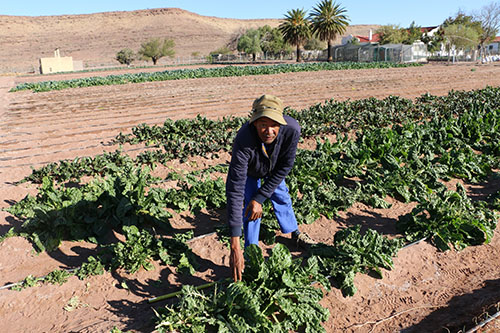MALTAHOHE – A green scheme project in the rural Hardap region, established to help the local community achieve food self-sufficiency, is finding the going tough but the handful of committed members are battling back.
The Daweb Green Scheme in the resettlement farms of Maltahöhe, purchased by the agriculture ministry in 2011 for N$10 million, was envisioned to become a thriving agribusiness hub, cultivating premium-quality fresh produce for local consumption and export to neighbouring countries.
Despite many obstacles, the three hectares under cultivation continue to produce an array of vegetables, including spinach, onions, cabbage, beetroots, butternuts and tomatoes.
However, its dreams have been marred by ongoing challenges, with the latest threat being persistent baboon intrusion that has cost the farm N$30 000 in losses daily over the past two weeks.
Last Friday, around 16h00, when New Era visited the farm, Jakobus Hanse, the green scheme manager and his three colleagues were visibly distressed after discovering their hard work reduced to ruins by the primates.
“The major problem here is the baboons. They are climbing the fence and devouring the vegetables, with spinach being their favourite daily treat,” Hanse lamented.
The baboons’ Friday afternoon snack session severely damaged the spinach section, where only bare stems remained, stripped of all their leaves.
While baboons pose a significant threat, other wild animals, such as squirrels, rabbits and birds also contribute to the challenges faced by the farm. Hanse revealed that rabbits and squirrels alone caused a staggering N$70 000 worth of damage to the spinach crop last year.
Seeking solutions, Hanse emphasised the urgent need for an electrical fence to deter the baboons and safeguard their produce.
The team spends the entire day monitoring their fields to ensure the baboons do not invade their crops.
“Even though we keep a close watch during the day to deter the wild animals, they still manage to damage the plants at night. That’s why we need electricity to install electrical fences,” he explained.
A glimmer of hope shines through, as they recently secured a contract to supply vegetables to tuberculosis patients and have attracted interest from another business in Mariental.
However, Hanse admits that the farm faces an uphill battle in securing a substantial market that can sustain its produce.
“Without proper refrigeration facilities, we are eager to find large buyers who can purchase directly from the fields,” he explained.
The farm currently houses 24 resettled individuals.
– ljason@nepc.com.na
(Daweb)


